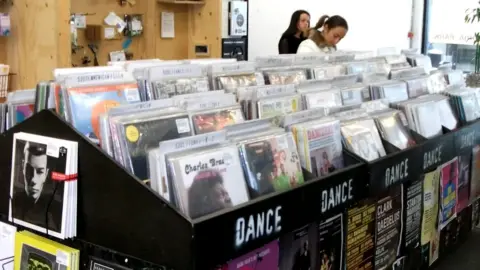Music industry revenue growth back at Britpop levels, BPI says
 BBC
BBCRevenue for UK record companies in 2017 notched up levels of growth not seen since the Britpop boom, according to industry association the BPI.
Combined takings from streaming, downloads, physical sales and licensing for use in films, TV and computer games rose 10.6% to £839m.
The main contributor to growth was streaming, which increased by 41.1%.
Revenues from streaming reached £388.8m, overtaking those from physical formats (£310.4m) for the first time.
However, revenue from the sale of vinyl records rose 24%, meaning that the market for vinyl is now one-fifth of the size of the CD market.
The rate of growth in music industry income was the fastest since 1995, when revenues increased by 10.7% on the back of Britpop bands such as Oasis, Blur and Pulp.
Now, record companies are banking on the success of stars such as Stormzy and Ed Sheeran, whose album Divide was the most popular record in all formats last year.
However, the BPI pointed out: "It should be noted that total income remains nearly one-third lower than the peak year of 2001, when it topped £1.2bn."
New developments
Geoff Taylor, chief executive of the BPI and the Brit Awards, said: "The changes labels have made to their business models and their investment in new talent have borne fruit with rapid revenue growth in 2017.
"We are likely to see a continuing rise in 2018, with increasing awareness among consumers about the benefits of music streaming, and new developments that are likely to encourage the uptake of subscriptions, such as the launch of YouTube's premium music service and the growing popularity of smart speakers in the home."
Last year, the BPI reported that music industry revenues, including income from public performance rights, had risen to £926m.
This year, figures from public performance rights are not yet available and will be announced later by the organisation that collects those revenues, Phonographic Performance Ltd.
The BPI repeated previous criticisms of what it called the "value gap", caused by some digital platforms, such as video streaming sites, that paid much lower royalties than competing digital music providers.
It said the revenue generated for the industry by ad-supported audio and video streaming "should have been much higher" than the £42m it brought in.
